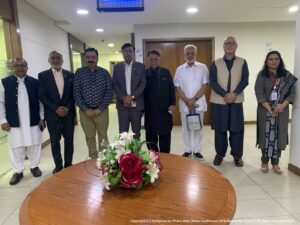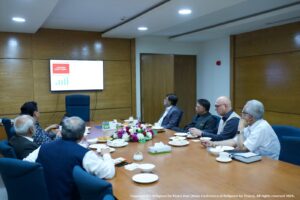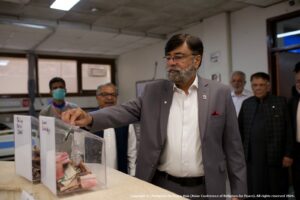 The recent visit of Vice President of Religions for Peace Pakistan Muhammad Hanif Khan and representatives to the local trauma center marked a pivotal moment in the ongoing efforts to promote compassionate care and community support for individuals facing medical emergencies and traumatic experiences. With a deep commitment to serving the needs of the community especially Multi religious and multi cultural the visit underscored the importance of prioritizing healthcare accessibility, trauma response, and mental wellness within the district.
The recent visit of Vice President of Religions for Peace Pakistan Muhammad Hanif Khan and representatives to the local trauma center marked a pivotal moment in the ongoing efforts to promote compassionate care and community support for individuals facing medical emergencies and traumatic experiences. With a deep commitment to serving the needs of the community especially Multi religious and multi cultural the visit underscored the importance of prioritizing healthcare accessibility, trauma response, and mental wellness within the district.
Upon arrival at the trauma center, the Vice President of Religions for Peace Pakistan Muhammad Hanif Khan and representatives were warmly welcomed by the medical staff, administrators, and support personnel, who expressed their gratitude for the opportunity to showcase the center’s vital role in providing critical care to individuals in crisis. Accompanied by healthcare professionals, they embarked on a comprehensive tour of the facility, gaining firsthand insight into the range of services offered and the challenges faced in delivering timely and effective care to patients.
During the tour, they engaged in meaningful conversations with frontline healthcare workers, listening attentively to their experiences, concerns, and suggestions for enhancing patient care and support services. These interactions highlighted the dedication and resilience of the medical team, as well as the pressing need for greater resources, training, and community engagement to address the complex needs of trauma patients to all without any distinction of caste, creed or religion.
 In addition to touring the medical facilities, the Vice President of Religions for Peace Pakistan Muhammad Hanif Khan and representatives took the opportunity to meet with patients and their families, offering words of encouragement, empathy, and solidarity in their time of need. These personal interactions underscored the human impact of trauma and reinforced Religions for Peace Pakistans commitment to advocating for policies and initiatives that prioritize mental health support, rehabilitation, and long-term recovery for survivors for people belonging to all communities and religions.
In addition to touring the medical facilities, the Vice President of Religions for Peace Pakistan Muhammad Hanif Khan and representatives took the opportunity to meet with patients and their families, offering words of encouragement, empathy, and solidarity in their time of need. These personal interactions underscored the human impact of trauma and reinforced Religions for Peace Pakistans commitment to advocating for policies and initiatives that prioritize mental health support, rehabilitation, and long-term recovery for survivors for people belonging to all communities and religions.
Furthermore, the visit served as a platform to raise awareness about the importance of trauma-informed care and the critical role that community engagement and collaboration play in building resilient healthcare systems. By fostering partnerships between local government, healthcare providers, community organizations, and advocacy groups, Religions for Peace Pakistan emphasized the need for a holistic approach to addressing trauma and promoting healing and well-being at both individual and societal levels.
 As the visit concluded, the of Vice President of Religions for Peace Pakistan Muhammad Hanif Khan expressed gratitude to the staff and volunteers of the trauma center for their dedication, professionalism, and compassion in serving the community. Recognizing the invaluable contributions of all those involved in the provision of trauma care, of Religions for Peace Pakistan pledged continued support and advocacy for initiatives aimed at improving access to quality healthcare, enhancing trauma response protocols, and fostering a culture of empathy and resilience within the district.
As the visit concluded, the of Vice President of Religions for Peace Pakistan Muhammad Hanif Khan expressed gratitude to the staff and volunteers of the trauma center for their dedication, professionalism, and compassion in serving the community. Recognizing the invaluable contributions of all those involved in the provision of trauma care, of Religions for Peace Pakistan pledged continued support and advocacy for initiatives aimed at improving access to quality healthcare, enhancing trauma response protocols, and fostering a culture of empathy and resilience within the district.
In reflecting on the visit to the trauma center, it became evident that while the challenges of trauma and medical emergencies are profound, so too are the opportunities for healing, growth, and community solidarity. By standing together in support of those affected by trauma, Religions for Peace Pakistan affirmed the commitment to nurturing a more compassionate, inclusive, and resilient society, where every individual has the opportunity to thrive and overcome adversity with dignity and hope.
